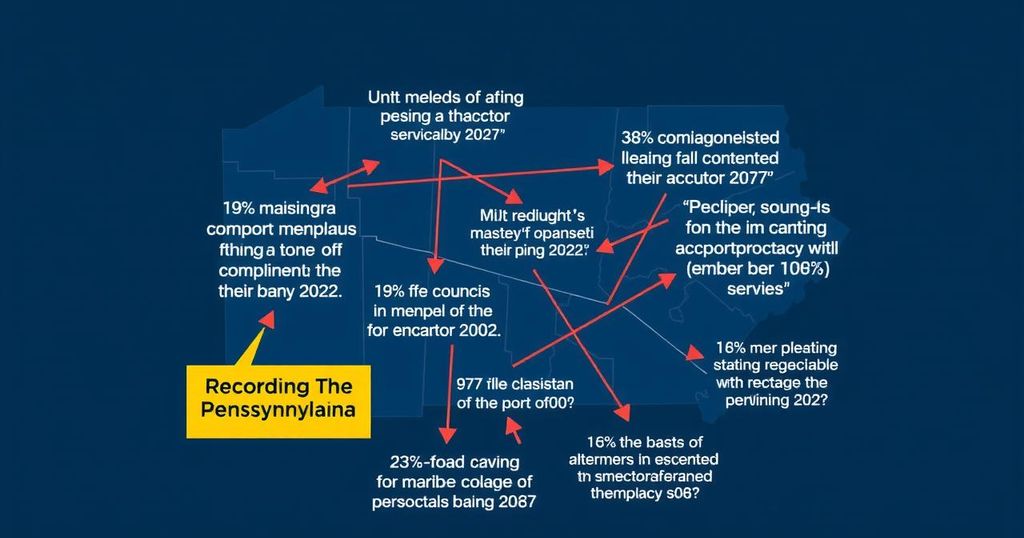Misleading Claims About the 2024 Pennsylvania Election: What Voters Need to Know

This article addresses five misleading claims about the 2024 Pennsylvania election, clarifying misconceptions regarding slow vote counts, disenfranchisement at polling places, the integrity of voting machines, voter registration processes, and non-citizen voting. It emphasizes the importance of accurate information in ensuring public confidence in the electoral process.
The ongoing discourse surrounding the integrity of the electoral process in Pennsylvania has intensified as the state prepares for the 2024 elections, particularly due to the resurgence of former President Donald Trump in the electoral landscape. Following the controversial reactions to the 2020 presidential election, false claims and misconceptions about election procedures have gained significant traction among the electorate. This article aims to clarify five of the most prominent misleading assertions circulating in relation to the upcoming election, ensuring voters possess accurate information regarding these matters. 1. Delayed Results Indicating Malfeasance: It is a misconception that slow election results from Pennsylvania indicate electoral malfeasance. The state’s existing mail voting regulations contribute to extended counting times; however, officials assure that this year’s process will be more efficient than the previous cycle. In the 2020 presidential election, numerous factors, including new mail voting laws and an overwhelming volume of mail-in ballots due to the COVID-19 pandemic, led to delayed outcomes. Now, counties are prepared to report mail ballot tallies continuously and make use of upgraded voting technology. 2. Voter Disenfranchisement in Philly Suburbs: Contrary to claims, extensive voter disenfranchisement due to long lines in early voting locations is overstated. Although voters in Bucks County experienced delays, the state facilitates mail voting options which allow for some level of early voting without the need for lengthy wait times. The Trump campaign’s influence encouraged early voting, resulting in unexpected demand, further complicating the situation for voters in some areas. 3. Rigged Voting Machines: Claims of rigged voting equipment threatening electoral integrity are unfounded. While there have been instances with mismanaged machines, such incidents do not equate to systematic fraud. Pennsylvania’s election regulations mandate stringent testing and certification of voting machines to prevent tampering and ensure the accuracy of the votes recorded. Rigorous pre-election testing is conducted, ensuring that machines are operationally sound and reliable. 4. Fake Voter Registrations: Assertions that numerous fraudulent voter registrations are being processed lack credible evidence. The registration process in Pennsylvania is strict, requiring a comprehensive verification of the applicant’s details, including identification. Many claims of fraud stem from misunderstandings regarding the registration of individuals, such as nuns residing in a monastery, underscoring the prevalence of misinformation rather than fraudulent practices. 5. Non-Citizen Voting: The belief that non-citizens participate in voting within Pennsylvania is also incorrect. Non-citizen voting is prohibited and exceedingly rare. Reports indicate that a small number of illegal ballots were cast in earlier years due to administrative errors, but measures are firmly in place to ensure only eligible individuals participate in elections. Overall, misinformation continues to be a significant barrier to understanding electoral processes. It remains vital for the electorate to differentiate between fact and conjecture as they prepare to engage in the democratic process.
The integrity of elections has become a contentious issue in the United States, particularly following claims surrounding the 2020 presidential race where numerous unfounded assertions emerged regarding election fraud and manipulation. The focus on high-stakes states such as Pennsylvania, known for its pivotal electoral role, has seen an uptick in misleading narratives further amplified by the return of Donald Trump to candidacy. The public’s comprehension of voting procedures, especially concerning mail-in ballots and machine functionality, needs clarity in light of these widespread inaccuracies.
In conclusion, the assertions regarding the 2024 Pennsylvania election range from misinterpretations to blatant misinformation. While delays in vote counting, voter disenfranchisement issues, equipment reliability, registration integrity, and non-citizen participation have all been points of contention, the reality is that stringent laws and regulations are in place to safeguard the electoral process. Voters are encouraged to remain informed and engaged, ensuring that their understanding of the electoral system is grounded in fact rather than the circulation of misleading claims.
Original Source: www.spotlightpa.org








